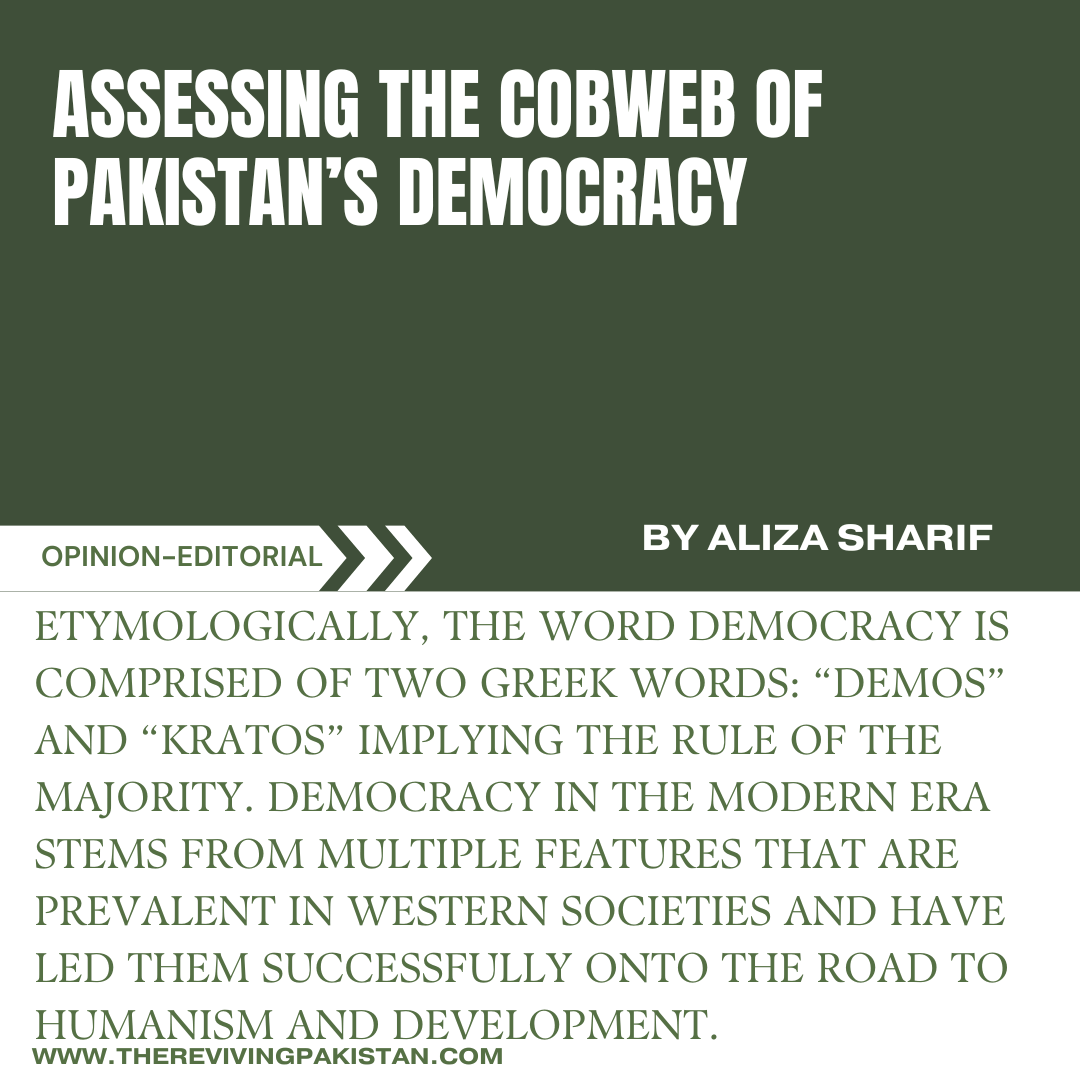About the Author(s)
Aliza Sharif holds a master’s degree in Defence and Diplomatic Studies from FJWU and loves to spend her time reading and writing. She has an interest in politics and international affairs.
Etymologically, the word democracy is comprised of two Greek words: “Demos” and “Kratos” implying the rule of the majority. Democracy in the modern era stems from multiple features that are prevalent in Western societies and have led them successfully onto the road to humanism and development. The subsequent analysis presents those salient features keeping in view Pakistan’s political landscape. The continuous upheavals that our beloved Pakistan is embroiled in today stem from these reasons.
Foremost to mention here is the freedom of expression which entails that opinion and opposition are welcomed with open-mindedness in a democracy. Conversely, these are dubbed as anti-state narratives closing all doors to chances of critical feedback paving the way for improvement. Discourse, debate and protest lie at the apex of a democratic society. What we witness is unfortunately the farthest from this oasis. The case study and brutal assassination of renowned journalist Arshad Sharif is an eye-opener in this regard among several other instances of threats and intimidations.
Furthermore, the rule of law is the pivotal attribute that distinguishes a democracy from a tyranny and it aims to protect the victim and punish the oppressor, in theory, but practically it fails to do so in Pakistan’s democracy as the rich and the powerful get their favors while the underprivileged ones have to undergo punitive measures for petty crimes or are even exploited for none at all. This had raised profound concerns among the masses who view their future bleak in this light reflecting that their trust towards their government is at the lowest ebb.
The guarantee of human rights forms the essence of a democratic state in its purest form. It seems to be a myth, almost too much to ask for. What Pakistan is faced with is an antithesis to democracy. The might is right, people can be deprived of their life, property or possessions but there’s little to no hope for a common man to get his grievances addressed or ensure his rights are fulfilled by the state institutions. If this situation persists, it can fan the flames of chaos resulting in over throw of the rulers as seen recently in Bangladesh where the attempt to suppress students’ protests led to a full-blown crisis and eventual fall of government.
Accountability and Transparency go hand in hand in a functional democracy. These can be termed as core components yet are also the most difficult to accomplish. It is the leadership that governs but people have the right to hold them accountable for their policies, actions and decisions. Our state being a pseudo democracy has been unable to curb the rampant misuse of resources, authority or finances. Transparency is barely reflected in the policies and the actions of our statesmen; therefore, the elite continues to lead their lives in an ivory tower detached from the real crisis that an ordinary citizen has to go through on a daily basis.
In democracy, all power is derived from a common man whose choice determines the fate of the ruler. The neutrality of Pakistan’s ECP has always been questioned as it fails to undertake preventive measures against rigging to ensure fair elections; an undeniable factor in a true democratic process. It becomes evident via its performance during elections that principles have been compromised. Such a hypocritical system can only bring about a mere change of the masters’ faces at the cost of fundamental rights and the overall progress of a nation.
The ultimate goal of democracy is to ensure stability and progress for its people. On the contrary, power struggle, use of force, inadequate necessities, non-availability of basic human rights and weak institutions are all the traits that are detrimental to democracy. The elected ones have failed to deliver their lofty promises as well as the institutions in upholding true democratic ideals. This has culminated in a massive out surge of talented youth abroad. The status quo continues to yield all power while the public is surrounded by challenges such as poverty, inflation and unemployment. The entire societal fabric has been damaged by the rising crime, extremism and intolerance making it harder to attract foreign investment which is indispensable in the development of a state. Thus, the aforementioned factors have caused horrendous damage to democracy and Pakistan appears to be caught up in a vicious circle and overcoming it is a Herculean task staring at us.

